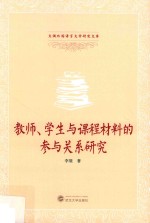
- 作 者:李展著
- 出 版 社:武汉:武汉大学出版社
- 出版年份:2018
- ISBN:9787307206441
- 标注页数:208 页
- PDF页数:225 页
请阅读订购服务说明与试读!
订购服务说明
1、本站所有的书默认都是PDF格式,该格式图书只能阅读和打印,不能再次编辑。
2、除分上下册或者多册的情况下,一般PDF页数一定要大于标注页数才建议下单购买。【本资源225 ≥208页】
图书下载及付费说明
1、所有的电子图书为PDF格式,支持电脑、手机、平板等各类电子设备阅读;可以任意拷贝文件到不同的阅读设备里进行阅读。
2、电子图书在提交订单后一般半小时内处理完成,最晚48小时内处理完成。(非工作日购买会延迟)
3、所有的电子图书都是原书直接扫描方式制作而成。
Chapter One Introduction 1
1.1 Motivation for the Study 1
1.2 Background of the Study 4
1.3 Aims of the Study and Research Questions 6
1.4 Structure of the Book 8
Chapter Two Teachers’Enactment of Curriculum Materials:A Participatory Perspective 9
2.1 Defining Key Concepts in the Study 9
2.1.1 Curriculum Materials vs.Materials 9
2.1.2 Curriculum Materials Use vs.Materials Development 11
2.2 The Role of English Language Textbooks in the Global Context 12
2.3 CE Curriculum and Textbooks in Mainland China 14
2.3.1 The Evolution of CE Curriculum 14
2.3.2 Five Generations of CE Textbooks 17
2.4 Research on the Teacher-Curriculum Relationship in ELT 20
2.4.1 Teachers’Adaptation of Materials 20
2.4.2 Teachers’Use of Materials in ELT 21
2.5 Research on the Teacher-Curriculum Relationship in Mainstream Education 24
2.5.1 The Educative Role of Curriculum Materials and Teacher Learning 27
2.5.2 Teachers’Factors Influencing Their Use of Curriculum Materials 29
2.6 The Theoretical Framework of the Study 29
2.6.1 Theoretical Perspectives on Curriculum Use 29
2.6.2 The Theoretical Perspective of This Study 30
2.6.3 The Theoretical Framework of This Study 32
2.7 Summary 34
Chapter Three Methodology 35
3.1 Qualitative Multi-Case Study 35
3.2 Selection of Setting,Participants and Materials 37
3.2.1 The Target University 38
3.2.2 Participants 39
3.2.3 Target Textbook 41
3.3 Data Collection 45
3.3.1 Data Collection Schedule 46
3.3.2 Data Collection Strategies 48
3.4 Data Analysis 55
3.4.1 Analysis of Interview Data 56
3.4.2 Analysis of Observational Data 57
3.4.3 Documentary Analysis 59
3.5 Trustworthiness 59
3.5.1 Triangulation 60
3.5.2 Thick Description 60
3.5.3 Member Checking 61
3.5.4 Management of Subjectivity 61
3.5.5 Ethical Considerations in Data Collection 62
3.6 Summary 63
Chapter Four Teachers’Use of and Interactions with the Curriculum Materials 64
4.1 Scope of the Chapter 64
4.2 Features of Teachers’Interactions with the Curriculum Materials 64
4.3 Map of Teachers’Interactions with the Curriculum Materials 66
4.4 Reading 67
4.4.1 Reading the Students’Book 67
4.4.2 Reading the Teachers’Book 74
4.5 Evaluating 82
4.6 Appropriating and Adapting 85
4.6.1 Adjusting 85
4.6.2 Replacing 87
4.6.3 Supplementing 89
4.6.4 Omitting 91
4.6.5 Revising 92
4.6.6 Inventing 93
4.7 Understanding Teachers’Actions 96
4.7.1 The Meaning of the Teachers’Reading Process 96
4.7.2 The Meaning of the Teachers’Evaluation Process 99
4.7.3 The Meaning of Teachers’Appropriating and Adapting Processes 100
4.8 Summary 103
Chapter Five Influences on Teachers’Interactions with the Curriculum Materials 105
5.1 Overview of the Influential Factors of Teacher-Text Interactions 105
5.2 Contextual Factors Affecting Teacher-Text Interactions 106
5.2.1 Aspects of the Local Cultures 106
5.2.2 Support for Teachers with Regard to Curriculum Material Use 108
5.2.3 Inflexibility of the CE Curriculum 112
5.3 Features of the Curriculum Materials 114
5.4 Teachers’Personal Resources 120
5.4.1 Teachers’Beliefs 120
5.4.2 Teachers’Management of Curriculum Materials 123
5.4.3 Teachers’Knowledge 124
5.4.4 Teachers’Curricular and Pedagogical Goals 128
5.5 Student Voice 130
5.6 Summary 136
Chapter Six Discussion 137
6.1 Findings of the Current Study 138
6.1.1 Responding to the First Research Question 138
6.1.2 Responding to the Second Research Question 139
6.2 Conceptualising the Enactment of Curriculum Materials 141
6.2.1 Theoretical Underpinnings of the Study 142
6.2.2 Theorising Curriculum Materials:Multi-Layered Affordances of Curriculum Materials 143
6.2.3 Formation of the Curriculum Instruments:From Artefacts to Instruments 146
6.2.4 Mediated Relations in Enacting Curriculum Materials 149
6.2.5 Teachers’Knowledge in Materials Use 154
6.3 Instrumentation:Curriculum Materials Shaping Curriculum Enactment 155
6.3.1 The Ostensible Authority of Curriculum Materials in ELT in the Chinese Context 156
6.3.2 The Educative Role of Curriculum Materials 158
6.4 Instrumentalisation:Teachers’Role in Shaping the Curriculum Materials 160
6.4.1 Conceptualising Teachers’Use of Curriculum Materials:Teachers’Cognitive Processes 160
6.4.2 Adaptation of Curriculum Materials 162
6.5 The Participatory Relations Among Teachers,Learners,Curriculum Materials and the Context 164
6.5.1 Teacher Voice 167
6.5.2 Student Voice 168
6.6 Revisiting the Theoretical Framework 169
6.7 Summary 172
Chapter Seven Conclusions and Implications 174
7.1 Summary of the Study 174
7.1.1 The Purpose and Methodology of the Study 174
7.1.2 Summary of the Findings 176
7.2 Significance of the Study 178
7.3 Implications 180
7.3.1 Theoretical Implications 180
7.3.2 Practical Implications 182
7.4 Limitations and Recommendations for Future Research 188
Appendix Ⅰ Baseline Teacher Interview Protocol 190
Appendix Ⅱ Pre- and Post-Observation Teacher Interviews 193
Appendix Ⅲ Baseline Student Interview Protocol 194
Appendix Ⅳ Observation Analysis 195
References 196
